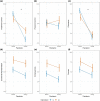The effect of the Covid-19 pandemic on illness perceptions of psoriasis and the role of depression: Findings from a cross-sectional study
- PMID: 36092261
- PMCID: PMC9435449
- DOI: 10.1002/ski2.145
The effect of the Covid-19 pandemic on illness perceptions of psoriasis and the role of depression: Findings from a cross-sectional study
Abstract
Background: Illness perceptions in psoriasis have an impact on adherence and disability. Changes in dermatological healthcare provision during the Covid-19 pandemic and distress may have affected illness perceptions in psoriasis patients.
Objectives: To test whether illness perceptions about psoriasis changed during the first year of the Covid-19 pandemic compared to pre-pandemic in a tertiary population with psoriasis and whether pandemic effects differed depending on depressive burden, given this population's high depression prevalence.
Methods: In a cross-sectional survey of n = 188 tertiary patients with dermatologist-confirmed psoriasis recruited before and during the pandemic, eight illness perceptions domains were assessed using the Brief-Illness Perceptions Questionnaire (BIPQ). Presence of depression was assessed with the Hospital Anxiety and Depression Scale (HADS).
Results: Beliefs about treatment control and patients' understanding of psoriasis were significantly worse in patients responding during the pandemic compared to before Covid-19. These differences were greater when depression was absent (treatment control: adjusted p < 0.001; coherence: adjusted p = 0.01). However, participants during the pandemic felt less emotionally affected (adjusted p = 0.02) and concerned (adjusted p = 0.007) about psoriasis, independently of depression.
Conclusions: We found diverse pandemic effects on illness perception domains in psoriasis. Uncertainty and reduced healthcare access may drive poorer treatment and coherence beliefs during Covid-19. These beliefs can hinder patients' health-promoting behaviours and may explain the high pandemic non-adherence reported previously in psoriasis. Appropriate interventions are needed to establish positive long-term cognitions and improve psoriasis management, for example, using the PsoWell patient materials. Dermatology services should invest in engaging and educating patients regardless of concurrent psychological distress.
© 2022 The Authors. Skin Health and Disease published by John Wiley & Sons Ltd on behalf of British Association of Dermatologists.
Conflict of interest statement
C. Elise Kleyn has received honoraria, consultant and/or research funding from Janssen, Eli Lilly, LEO, Novartis, Abbvie, UCB, Almirall, Pfizer, and L’Oréal. Hector Chinoy has received personal compensation for activities with Novartis, UCB, Lilly, Biogen, Orphazyme as a speaker, advisory board member or consultancy, grants via The University of Manchester from Novartis, UCB and MedImmune, and has received travel support from Abbvie and Janssen. Richard B. Warren has received research grants from AbbVie, Almirall, Amgen, Celgene, Janssen, Lilly, Leo, Medac, Novartis, Pfizer, and UCB and consulting fees from AbbVie, Almirall, Amgen, Arena, Astellas, Avillion, Boehringer Ingelheim, Bristol Myers Squibb, Celgene, DiCE, GSK, Janssen, Lilly, Leo, Medac, Novartis, Pfizer, Sanofi, Sun Pharma, UCB, and UNION. GL has received speaker honoraria from Janssen, Lilly, Leo, and Novartis. Peter S. Talbot has no conflicts of interest.
Figures

Similar articles
-
'New to me': changing patient understanding of psoriasis and identifying mechanisms of change. The Pso Well® patient materials mixed-methods feasibility study.Br J Dermatol. 2017 Sep;177(3):758-770. doi: 10.1111/bjd.15574. Epub 2017 Aug 17. Br J Dermatol. 2017. PMID: 28403510 Free PMC article.
-
Psychological stress, distress and disability in patients with psoriasis: consensus and variation in the contribution of illness perceptions, coping and alexithymia.Br J Clin Psychol. 2002 Jun;41(Pt 2):157-74. doi: 10.1348/014466502163949. Br J Clin Psychol. 2002. PMID: 12034003
-
Investigating the relationship of COVID-19 related stress and media consumption with schizotypy, depression, and anxiety in cross-sectional surveys repeated throughout the pandemic in Germany and the UK.Elife. 2022 Jul 4;11:e75893. doi: 10.7554/eLife.75893. Elife. 2022. PMID: 35781372 Free PMC article.
-
Fertility patients under COVID-19: attitudes, perceptions and psychological reactions.Hum Reprod. 2020 Dec 1;35(12):2774-2783. doi: 10.1093/humrep/deaa248. Hum Reprod. 2020. PMID: 32877507 Free PMC article.
-
Adherence to systemic therapy in patients with psoriasis during the COVID-19 pandemic: A multicenter study.J Cosmet Dermatol. 2022 Jan;21(1):39-47. doi: 10.1111/jocd.14610. Epub 2021 Nov 18. J Cosmet Dermatol. 2022. PMID: 34792848 Free PMC article.
Cited by
-
Impact of the COVID-19 Pandemic on the Mental Health and Quality of Life of Patients with Psoriasis in Tertiary Care; A One-year Follow-up.Acta Derm Venereol. 2022 Nov 14;102:adv00814. doi: 10.2340/actadv.v102.2464. Acta Derm Venereol. 2022. PMID: 36129250 Free PMC article. No abstract available.
-
Correlation of Specific Inflammatory Markers With the Occurrence of Depression in Patients With Psoriasis and Their Use as Biomarkers for the Diagnosis of Depression.Dermatol Pract Concept. 2024 Apr 1;14(2):e2024104. doi: 10.5826/dpc.1402a104. Dermatol Pract Concept. 2024. PMID: 38810053 Free PMC article.
References
LinkOut - more resources
Full Text Sources
